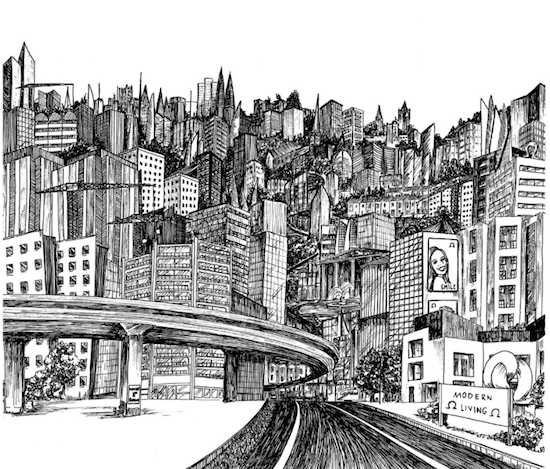We enter the world of Omegaville at breakneck speed. This massive, conceptual double album does not begin with any grand overture or introduction – Anthroprophh require no scene setting. Led by the titanic guitar force of Paul Allen, this fierce vision of pressurised dystopia begins with the gut-churning salvo of ‘2023’, a two-minute barrage of manic fuzz, like a hypercharged ‘Neat Neat Neat’. It duly blasts onwards through the monstrous ‘Dead Inside’ – similarly rabid and not much longer – then again, again and again through the spinning ‘Housing Act 1980’, then the rabid grit of ‘Oakmoll’. There is no pause, no time to gather your senses, just layer after layer of pummelling and freewheeling guitars – hectic squalls caterwauling over churning riffs, the momentum constantly searing upwards.
And then, one minute into ‘Sod’, just as this stampeding record seems to be careening out of control altogether, there’s a sudden, thudding stop, a silence that lasts only a second or two but one that jolts like whiplash. Until now the record’s been nothing but a bracing experience, for the most part thanks to Allen’s guitar; in this tiny pocket of calm you’re given a split-second to take stock of its power.
This is a much deeper work than that mad, dizzying first rush might suggest; the very fact it’s structured this way is itself part of an overarching concept. Allen has spoken about the influence of Can’s Tago Mago, particularly the way in which the record was frontloaded with its most conventional tracks before easing its way into more experimental climes in the second half. He also discussed the concept behind Omegaville in a
recent tQ interview: "It starts off with general first-world problems – ‘Sod’, for example, is vaguely about how crap it can be to be in a band – but then it descends into being about the gentrification of my hometown and the possible outcome for the not-so-wealthy. The sounds at the end of the record are supposed to be from an imagined out-of-town hellish reservation where an overwhelming number of us end up homeless and insane. It’s not a happy ending, but not an improbable scenario for people in my situation and for many of my friends and their offspring. That’s if we continue with our current trajectory, with housing especially."
This pause during ‘Sod’ is the first of a number of important moments on an album that is peppered with little dividers. They can mark a shift in tone, but more importantly offer a look back on what’s happened so far, to get a grip on the consequences of the captivating music that’s already passed. ‘Sod’ continues after the break with a jarring combination of sickly coughs and gloomily twanged undistorted guitar, before breaking back into a tempest that’s now more sprawling and disconcerting than before. Things are getting more unsettling, it’s not just blistering riffage now but apocalyptic choirs (‘Death Salad’) and genuinely chilling, cultish chants (‘Why Are You Smiling?’).
On Omegaville, Anthroprophh keep pushing and pushing, laying on one oppressive and opaque layer after another, and delving further and deeper into their only semi-imagined dystopia. There is another of those pauses before ‘I’, a track on which they intensify their assault once more with a colossal roar, the precursor to the outer reaches.
The album ends with its two, final pushes towards the depths: the fifteen-minute ‘OMEGAVILLE/THROB’ and the even longer ‘Journey out of OMEGAVILLE and into the………..’. It is the first, not the second that is the climax, though. ‘OMEGAVILLE/THROB’ finds Anthroprophh cascading and avalanching downwards with even more force than before, the final cataclysmic throes of crushing metropolitan dystopia, while ‘Journey out of OMEGAVILLE and into the………..’ is a bleak, drifting postscript. On this track we awake in that “out-of-town hellish reservation where an overwhelming number of us end up homeless and insane”. It is an eerie, sparse drift, unfocused and instinctive as the sounds of basic percussion, howling wolves and the scraping of knives take over. Just as in the shorter pauses on the record we are forced to take stock, to acknowledge and absorb what has gone before, only now we do so from this post-apocalyptic vantage point. The entire scope of Omegaville is laid out in front of us, and it is dark and terrifying.


